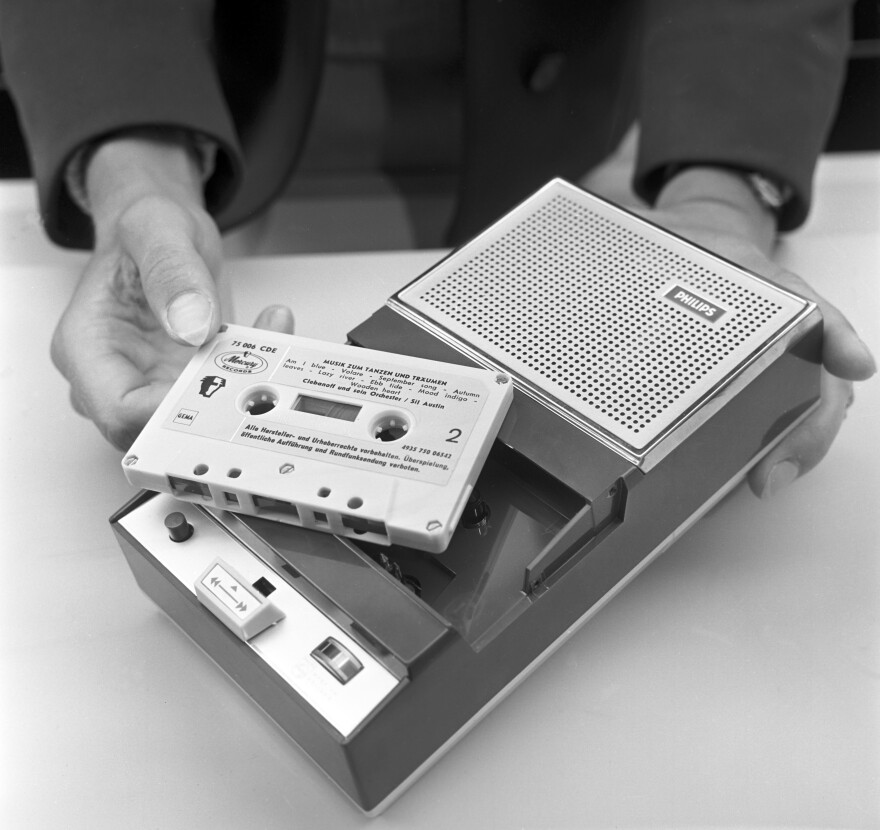Lou Ottens, who put music lovers around the world on a path toward playlists and mixtapes by leading the invention of the first cassette tape, has died at age 94, according to media reports in the Netherlands. Ottens was a talented and influential engineer at Philips, where he also helped develop consumer compact discs.
Ottens died last Saturday, according to the Dutch news outlet NRC Handelsblad, which lists his age as 94.
The cassette tape was Ottens' answer to the large reel-to-reel tapes that provided high-quality sound but were seen as too clunky and expensive. He took on the challenge of shrinking tape technology in the early 1960s, when he became the head of new product development in Hasselt, Belgium, for the Dutch-based Philips technology company.
"Lou wanted music to be portable and accessible," says documentary filmmaker Zack Taylor, who spent days with Ottens for his film Cassette: A Documentary Mixtape.
Ottens' goal was to make something simple and affordable for anyone to use. As Taylor says, "He advocated for Philips to license this new format to other manufacturers for free, paving the way for cassettes to become a worldwide standard."
But first, he had to invent it. Trying to envision something that didn't yet exist, Ottens used a wooden block that was small and thin enough to fit in his pocket as the target for what the future of tape recording and playback should be.
The result was unveiled to the world in 1963, and the "compact cassette" quickly took off: It was "a sensation" from the start, Ottens told Time in 2013, on the cassette's 50th anniversary.
"Lou was an extraordinary man who loved technology, even as his inventions had humble beginnings," said Philips Museum Director Olga Coolen. She noted that Ottens' original wooden prototype for the cassette "was lost when Lou used it to prop up his jack while change a flat tire."
Born in 1926, Ottens went from building a radio for his family during World War II — it reportedly had a directional antenna so it could focus on radio signals despite Nazi jamming attempts — to developing technology that would democratize music.
"Cassettes taught us how to use our voice, even when the message came from someone else's songs, compiled painstakingly on a mixtape," Taylor said. Describing how little things have changed, he added, "So next time you make that perfect playlist on Spotify or send a link to share a song, you can thank Lou Ottens."
Ottens was famously unsentimental about the invention that has accounted for some 100 billion sales, according to NRC. In a career devoted to seeking higher fidelity and advancing technology, he dismissed tapes as primitive and prone to noise and distortion.
True to their do-it-yourself roots, cassette mixtapes have long been a favorite of punk and rock fans. But their legacy also looms large in hip-hop, where aspiring rappers and producers have used the approach to showcase their ability to chop up other music and create something new. The mixtape ethos has survived — and even thrived — despite the move from magnetic tapes to CDs and digital formats.
Nearly 20 years after Philips introduced cassette tapes, Ottens helped the company to develop compact disc technology for the consumer market and, with Sony, to settle on a format that would become the industry standard.
"From now on, the conventional record player is obsolete," Ottens declared when production CD players emerged, as the BBC reported.
Similar predictions were made about the cassette tape. But interest in the format has surged in recent years, despite the remaking of the music industry in the digital and streaming age.
The resurgence is driven by a mix of nostalgia and an appreciation for tapes' unique status as a tangible but flexible format. For decades, music fans have used mixtapes to curate and share their favorite songs. Unsigned bands have also relied on them as a way to promote their music.
Those who have used cassettes to quickly record music include the Rolling Stones' Keith Richards, who famously said he captured one of his band's biggest songs in the middle of the night.
"I wrote 'Satisfaction' in my sleep," Richards wrote inLife,his 2010 autobiography. Adding that he had no memory of writing the song, Richards said he woke up one morning to find that his Philips cassette recorder was at the end of its tape — apparently, he concluded, he had written something during the night.
When Richards rewound the tape, he heard the song's now-iconic guitar riff and his voice saying, "I can't get no satisfaction."
For many, cassettes have kept their cult status because they fulfill a dual promise of being both affordable and personal. They can hold anything from a carefully sequenced lineup of rare recordings to children putting on their own radio show.
"It's the most accessible, easiest, cheapest way for anyone to record a piece of audio," Matthew David of the Leaving Records music label told NPR back in 2011, when cassettes were enjoying a renaissance.
Cassette tapes have also become collectors' items. When Raekwon's solo debut, Only Built 4 Cuban Linx...,hit the market in 1995, for instance, it arrived in a rare purple-hued cassette tape that became a cultural touchstone and a hotly sought item.
Ottens' death follows a banner year for his invention. In 2020, a wide range of musicians found success selling cassette tapes, from Lady Gaga and Ozzy Osbourne to Selena Gomez and Gorillaz.
Coolen said the runaway success of Ottens' ideas surprised him.
" 'We knew it could become big but could have never imagined it would be a revolution,' " she quoted him as saying.
Copyright 2021 NPR. To see more, visit https://www.npr.org. 9(MDA4MDc0NDkyMDEzMTQ4ODU0MTE0OGNiNg004))


